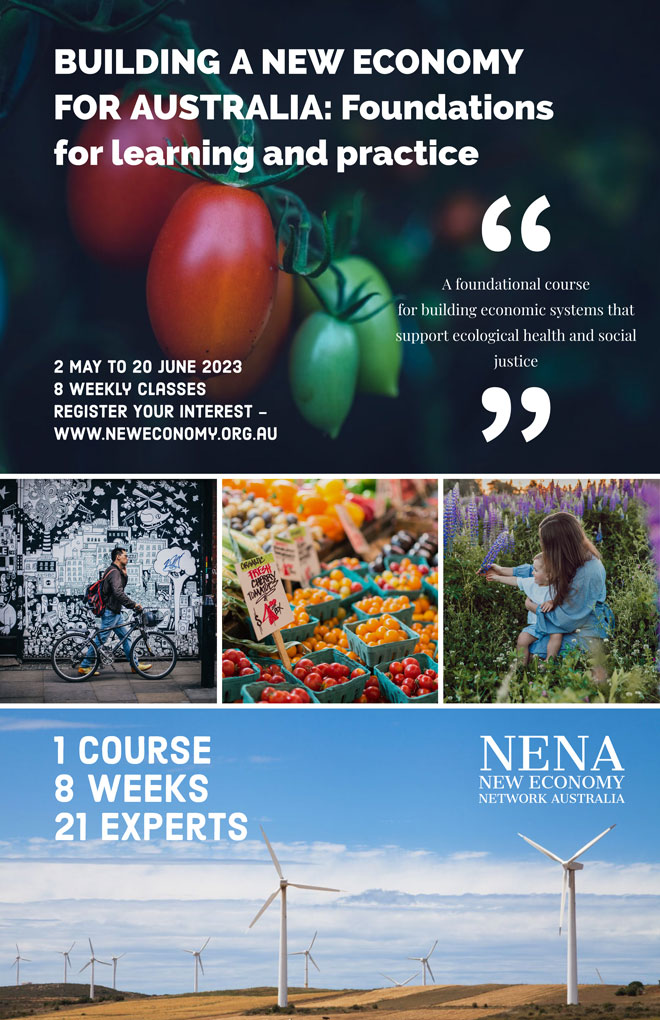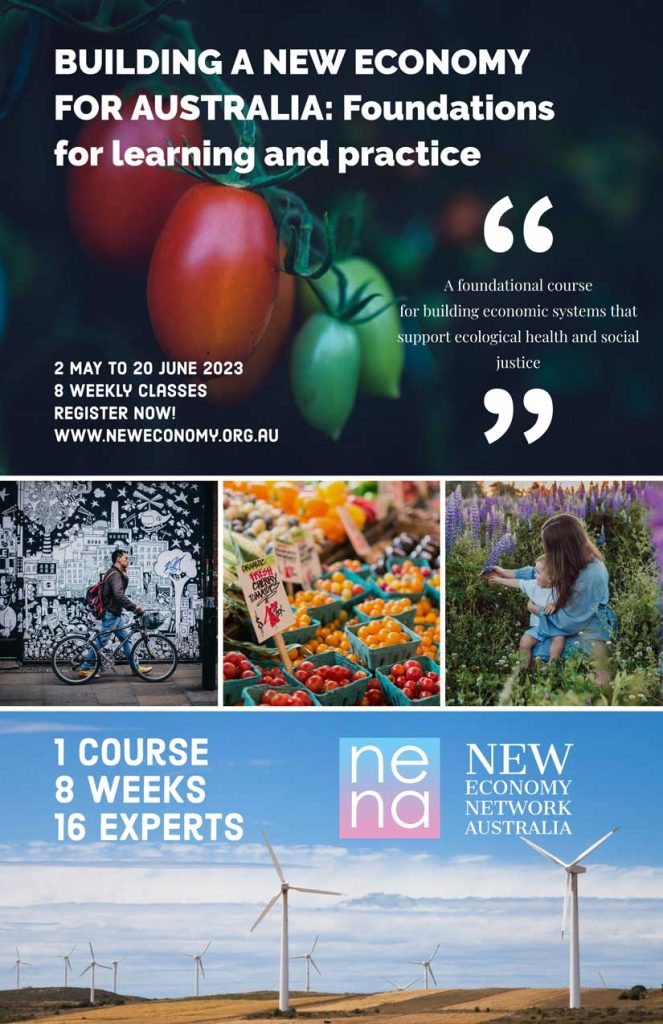Building a New Economy for Australia 2023

About the Course

This course will offer a 2 hour ‘live’ class each week, for 8 weeks on a Tuesday night, from 4pm-6pm AEST (starting Tues 2 May and finishing Tuesday 20 June 2023).
Each class will include a number of expert speakers, with discussions facilitated by the course hosts.
Participants will be provided with reading, viewing and listening material, to help you prepare for each week’s class. Watching and reading the set materials will help maximise your learning in the live classes.
Practical case studies and examples will be discussed each week, to enable participants to connect theory with practice.
Questions? Please email: nena@neweconomy.org.au
What you will learn
- Develop your ability to analyse our current economic system from a systems change perspective
- Build your knowledge about theories and practical solutions that challenge the ‘business as usual’ economic paradigm which contributes to social injustice and the destruction of the living world
- Connect and collaborate with a network of like-minded, multi-disciplinary professionals
- Engage at a personal and professional level, with a positive vision for the future
What is included?
- Live online classes with Australian practitioners and experts from a range of economic sectors, designed to encourage focussed and active participation.
- Access to recordings of all online classes and materials for working at your own pace.
- A collection of resources (for reading, watching and listening) including real-world examples.
- An optional assessment module for those seeking a certificate of completion and/or digital badge. Assessment will involve two elements: (1) a multiple choice test and (2) a written essay (or as an alternative to the written essay, a verbal presentation) addressing key issues addressed in the course.
Course content
During our 8 week course you will:
- Critique neo-classical economics and learn about alternative approaches to economics, including Steady State, Ecological Economics, Wellbeing and Doughnut Economics
- Be introduced to systems level thinking and approaches to creating positive change
- Learn how to critique western disciplines of knowledge and think across systems
- Learn about Indigenous approaches to economic thinking, including the Relationist Ethos
- Explore regenerative practices and viable solutions being implemented across multiple sectors of the economy, including work, housing, energy and food
- Learn how to critically engage with current and emerging trends that challenge dominant paradigms and propose different approaches
- Learn how to articulate the role and significance of civil society in creating alternatives to the current economic paradigm, and in influencing government policy and global challenges
- Develop new approaches to your own projects, work, and career path
Mode of delivery
- All classes are delivered online (using Zoom video conferencing).
- Live classes will be held on Tuesdays from 4pm to 6pm AEST (Australian Eastern Standard Time), to allow you to complete the course amid existing professional and personal commitments. Classes are informal and interactive, to enable participants to get to know each other, build connections and learn in different ways.
- Each class includes the course facilitator and up to two expert speakers. Short talks will be given live in class, followed by opportunities for questions and discussions.
- Resources – including reading lists and video/audio materials – will be available several weeks before the course commences, for people who would like to engage with the course materials and prepare for the class discussions.
Course cost for 8 weeks
- $495 – per person, for corporate/government
- $295 – per person, for community/individual
Limited scholarships are available for students and volunteers of not-for-profit organisations who need support to participate in the course. Payment plans are also available – please email us at nena@neweconomy.org.au for the details.
Assessment
Assessment is optional. For those seeking a certificate of completion and/or digital badge, NENA offers an assessment module at the end of the course.
To be eligible for a digital badge, participants must have attended a minimum of 5 out of the 8 live classes, and completed two pieces of assessment:
Assessment includes: (1) a multiple choice test and (2) a written essay (or as an alternative to the written essay, an oral presentation) addressing key issues addressed in the course.
Course Facilitator and Guest Speakers
- Dr Richard Denniss, Australia Institute
- Adjunct Associate Professor Mary Graham, Kombumerri First Nations person and University of Queensland
- Katherine Trebeck, Co-Founder of the International Wellbeing Economy Alliance
- Tim Hollo, The Green Institute
- Dr Michelle Maloney, New Economy Network Australia and Australian Earth Laws Alliance
- Associate Professor Louise Crabtree, Western Sydney University
- Morag Gamble, Permaculture Education Institute
- April Crawford-Smith, Pingala Energy
- Antony McMullen, Business Council of Cooperatives and Mutuals (BCCM)
- Professor Brendan Mackey, Griffith Climate Action Beacon
- Professor Bronwen Morgan, UNSW
- Dr Nick Rose, Sustain
- Elena Pereya, Co-Housing Australia
- Dr Jose Ramos, Action Foresight
- Mike Salvaris, Australian National Development Index (ANDI)
- Professor Yin Paradies, Deakin University
Facilitated by
- Dr Michelle Maloney, New Economy Network Australia (NENA) and Australian Earth Laws Alliance (AELA)
- Rhiannon Hardwick, New Economy Network Australia (NENA)
Testimonials from previous students
I live on a rural family farm where we have a passion for creating community and working with natural intelligence. So many big ideas have felt to fall on mute ears over the years, but this course has helped to create both an energetic and practical emergent framework for our larger vision. I am sure it will do that for others who enrol.
Course Content
Course Introduction and Zoom Links
-
Introduction and Zoom Links